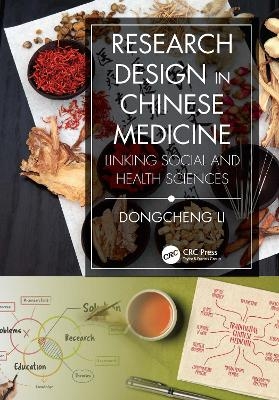
Research Design in Chinese Medicine
CRC Press (Verlag)
978-1-032-80069-1 (ISBN)
Designed for a diverse readership, from TCM students and practitioners to those in social sciences and holistic medicine, the book provides a unique integration of traditional techniques and modern research approaches. It offers invaluable resources for Doctor of Acupuncture and Herbal Medicine (DAHM) students, helping them deepen and refine their research skills. Additionally, it serves as an essential academic tool for educators in TCM and related fields, perfectly suited for course adoption in over 50 accredited acupuncture schools within the U.S. and extending its reach globally.
Research Design in Chinese Medicine: Linking Social and Health Sciences offers a balanced emphasis on both qualitative and quantitative research approaches. This holistic methodology ensures that readers gain a full spectrum of knowledge, from formulating research questions to conducting ethical studies. The step-by-step guide provided in the book is supplemented with a wealth of resources, including a dedicated website, downloadable templates, and case studies, making it not just a book but a complete learning experience.
The book is positioned to be a key resource in the field of TCM research. Its interdisciplinary approach and practical guidance make it invaluable to anyone looking to conduct meaningful research in TCM. The combination of the author's expertise and the practical tools offered makes this book a must-have for students, practitioners, and researchers in the field.
Dongcheng Li is an acupuncture physician in Florida, a board-certified by NCCAOM and the founder of Global TCM Education Center, holding a doctoral degree in Education from Johns Hopkins University. He has enriched his teaching career by instructing at several acupuncture colleges in the United States. Recently, he introduced an innovative concept by integrating social and health sciences into Chinese medicine research, offering the potential for independent research opportunities for Chinese medicine practitioners and creative solutions for doctoral students in acupuncture colleges. Dr. Li, a fifth-generation Traditional Chinese Medicine (TCM) practitioner, received comprehensive training in China from a young age. He holds a Medical Degree in TCM, a Master's degree in Chinese Medicine from Chinese universities, and a Master's degree in Exercise Physiology from the United States. Dr. Li is also an accomplished author, with several popular books available on Amazon.com. Since 2009, he has been actively teaching Acupuncture Board Licensing exam preparation courses throughout the United States, benefiting thousands of people worldwide directly or indirectly through his training books and courses. With over 15 years of experience in acupuncture and Chinese medicine, he currently operates a private practice in South Florida.
Chapter 1: Getting Started: The Purpose and Ideas of Research
Chapter 2: Formulating a Research Question
Chapter 3: Ethics in Social and Health Research
Chapter 4 Conducting Literature Reviews
Chapter 5 Quantitative Research Designs
Chapter 6: Measurement Errors, Reliability, and Validity
Chapter 7 Sampling and Recruitment
Chapter 8: The Experiment and Quasi-Experimentation Designs
Chapter 9: Data Collection for Quantitative Research
Chapter 10: Secondary Data
Chapter 11: Data Entry and Management in Quantitative Research
Chapter 12: Analyzing Quantitative Data
Chapter 13: Qualitative Designs and Data Collection
Chapter 14: Entering, Coding, and Analyzing Qualitative Data
Chapter 15: Mixed-method Design
Chapter 16: Results and Discussion
Chapter 17: Presenting and Disseminating Your Research
Chapter 18: Reflecting on the Journey
| Erscheinungsdatum | 06.11.2024 |
|---|---|
| Zusatzinfo | 3 Tables, black and white; 3 Line drawings, black and white; 3 Illustrations, black and white |
| Verlagsort | London |
| Sprache | englisch |
| Maße | 178 x 254 mm |
| Gewicht | 453 g |
| Themenwelt | Geisteswissenschaften ► Psychologie ► Allgemeine Psychologie |
| Medizin / Pharmazie ► Naturheilkunde | |
| Studium ► Querschnittsbereiche ► Prävention / Gesundheitsförderung | |
| ISBN-10 | 1-032-80069-0 / 1032800690 |
| ISBN-13 | 978-1-032-80069-1 / 9781032800691 |
| Zustand | Neuware |
| Informationen gemäß Produktsicherheitsverordnung (GPSR) | |
| Haben Sie eine Frage zum Produkt? |
aus dem Bereich


